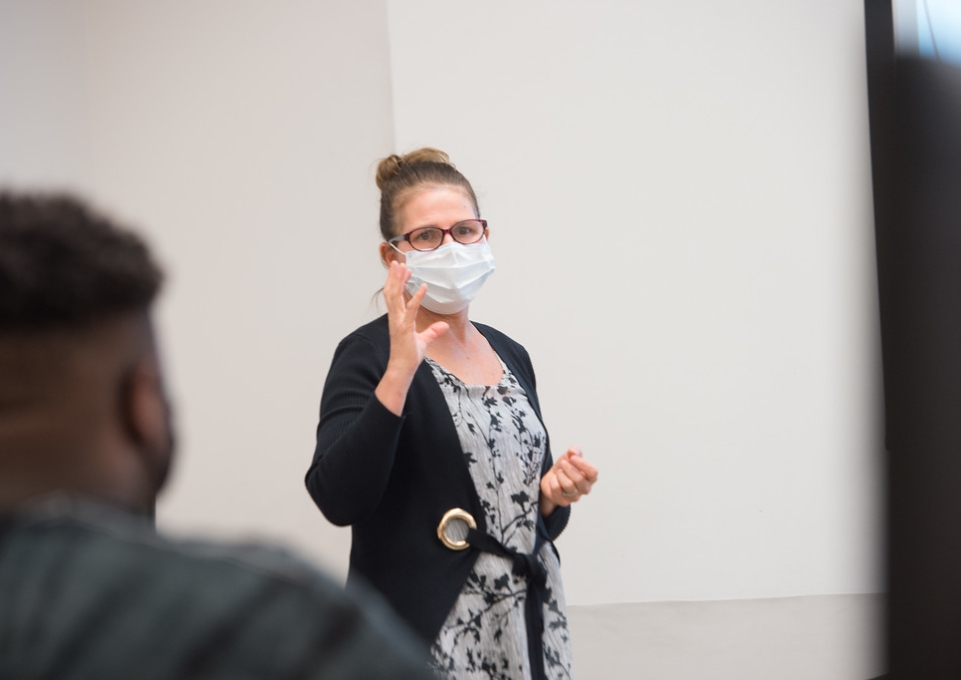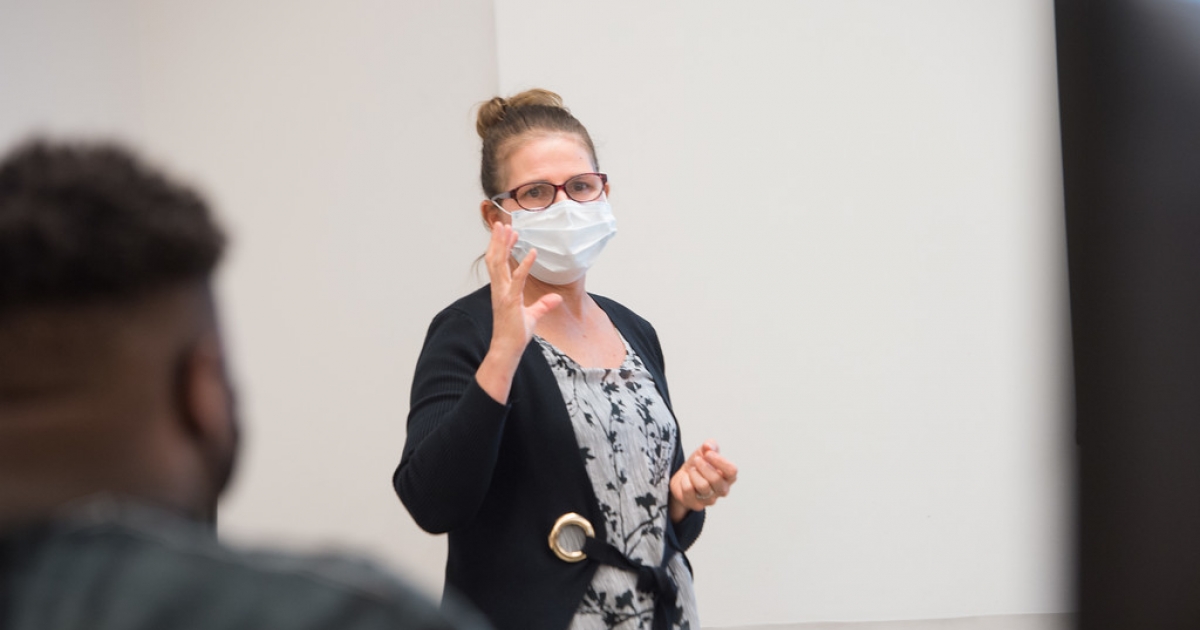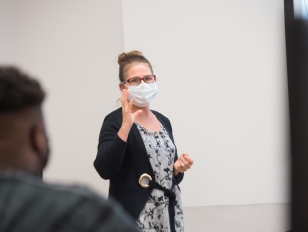
Undergraduate research provides a glimpse into what it’s like to be a real scientist. Students in Buffalo State College biology labs are expected to formulate questions, test hypotheses, evaluate results, and ultimately share conclusions with the broader scientific community.
“Successful scientist-students ask very good questions, tend to be very independent, and are able to use the tools on hand to solve problems,” said Martha Skerrett, professor of biology.
Skerrett, who has worked at Buffalo State for 15 years, has mentored more than 50 undergraduate and graduate students on research projects, many funded by the American Heart Association or the National Institutes of Health.
“I appreciate that as an institution, Buffalo State is committed to supporting students in those opportunities,” Skerrett said. “Research with a professor is arguably one of the most accessible and rewarding experiential-learning opportunities.”
“Research with a professor is arguably one of the most accessible and rewarding experiential-learning opportunities.”
Many of Skerrett’s students had their research presented at national conferences and published in academic journals—even before earning their bachelor’s degrees.
“There’s a lot of excitement in finding students with special talent for research,” Skerrett said. “It’s not something that’s apparent in test grades or academic success.”
Undergraduate research with a faculty mentor offers a powerful learning opportunity that goes beyond the traditional classroom experience. Adam DePriest, B.A. ’10, M.S. ’12, was one of the first students to work with Skerrett during her first semester teaching in 2005. After taking her 200-level biology course, DePriest said, Skerrett ignited his interest in research.
“Dr. Skerrett got me really excited about research and took me under her wing,” said DePriest, whose first study as an undergraduate was published in Biophysical Journal (2010) and has since been cited in several other academic publications. DePriest now works alongside his former professor as a lecturer and instructional support technician for the Biology Department, with 10 peer-reviewed publications under his belt.
DePriest describes Skerrett as “the most influential person in my life.”
DePriest also works closely with current students. As an alumnus, he feels strongly that providing real research experience opens doors for students like him.
“Buffalo State gives students opportunities, especially those who would not have them otherwise for financial or academic reasons,” he said. “I know because I was one of those students. I grew up very poor and with a single mother. With extra support, our students end up going further because they have the drive and determination.”
Alumni who have worked with Skerrett make up a community of researchers, medical practitioners, and scholars across the country. They have a strong affinitsy for their time spent in their beloved “Skerrett Lab.”
Yvonne Woolwine Cunningham, B.A. ’08, connected with Skerrett as an undergraduate honors student. Cunningham credits Skerrett’s ability to “adjust to a lot of different learning styles.”
“Buffalo State gives students opportunities, especially those who would not have them otherwise for financial or academic reasons. I know because I was one of those students.”
According to Cunningham, Skerrett mentors students with an individualized approach.
“She goes out of her way to provide students who need a little more guidance,” she said, “but also supports those who are comfortable working more independently.”
Cunningham, who previously worked in clinical research at the University at Buffalo, is a protocol data manager for Frontier Science and Technology, a global data management nonprofit that provides information and support services to research networks, pharmaceutical companies, and investigators.
She is currently engaged in research on adolescents and infants with HIV. She interacts with facilities in several countries who are treating these patients, assists with interpreting treatment protocol, and prepares data for Frontier’s pharmaceutical clients.
Making Discoveries, Forging Careers
Skerrett says undergraduate research gives students a competitive edge when applying to jobs and postbaccalaureate degree programs, including to medical school and Ph.D. programs.
“I write a lot of letters of recommendations for our amazing students,” Skerrett explained. “It’s exciting that research at Buffalo State played a small part in helping them achieve those goals.”
For Jafaar Hadman, B.A. ’12, Skerrett’s recommendation and additional staff support applications were instrumental when he applied to medical school.
“My Buffalo State experience made me a strong candidate for medical school, and during my interviews people were impressed I had conducted research in physiology as an undergrad,” said Hadman, who received an M.D. from the American University of Antigua in 2020 and is currently applying to internal medicine residency programs in the United States.
“Even as I apply to residencies, I still get asked questions about my research at Buffalo State. It was an amazing place for me to start my medical career,” he said. “I was able to immerse myself in real research, to essentially understand the cell membrane and how it functions, which strongly relates to how doctors treat pathological conditions.”
Matthew Brennan, B.A. ’11, also said the skills he gained through undergraduate research have paid off in his advanced research-driven degree programs.
“Dr. Skerrett provides a great balance of oversight and independence with her students. I never felt alone or that I was micromanaged. I am still very active in research, and to this day, the skills she provided me still hold true.”
“Dr. Skerrett provides a great balance of oversight and independence with her students. I never felt alone or that I was micromanaged,” he said. “I had the opportunity to take things from basic lab work all the way to data analysis, scientific writing, and publication. I am still very active in research, and to this day, the skills she provided me still hold true.”
After graduating from Buffalo State, Brennan earned an M.P.H. from Stony Brook University and a D.O. from the Touro College of Osteopathic Medicine in Middletown, New York.
Of his interview process at Touro, Brennan said, “I recall that an interviewee, who became me professor, was very interested in the research I did at Buffalo State.”
Brennan is halfway through a five-year residency at the Philadelphia College of Osteopathic Medicine, where he focuses in ears, nose, and throat facial and plastic surgery.
“We work with a number of hospitals and surgeons, and essentially provide everything from emergency to elective procedures, and everything in between,” he said. “I still reference skills I was taught by Dr. Skerrett, and she had a strong influence on my scientific writing as well.”
Like many of the alumni of Skerrett Lab, Cunningham, Brennan, DePriest, and Hadman have not only maintained a strong connection to Skerrett but have also formed relationships among their former peers, not only as friends but as colleagues.
“You don’t get that one-on-one attention at a large university that you would get from Buffalo State,” Cunningham said. “Your professors really care, and get to know you; you can develop close relationships with your professors and lifelong connections with fellow students.
“I could have taken a very different career path,” she said. “I would not have ended up in clinical research if I didn’t have the opportunities or skills I gained working with Dr. Skerrett.”
Pictured top: Buffalo State professor of biology I. Martha Skerrett meets with graduate students in a computer lab at Buffalo State College. Skerrett, who earned her Ph.D. from Flinders University in South Australia, specializes in cell biology, physiology, and neuroscience. She has held previous faculty posts at the University at Buffalo and Brock University (St. Catharines, Ontario).
Photos by Bruce Fox, campus photographer.



